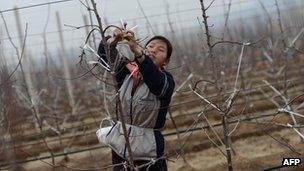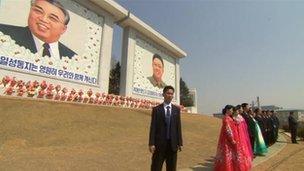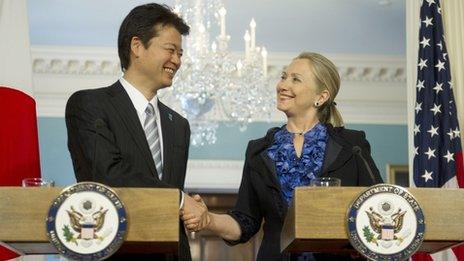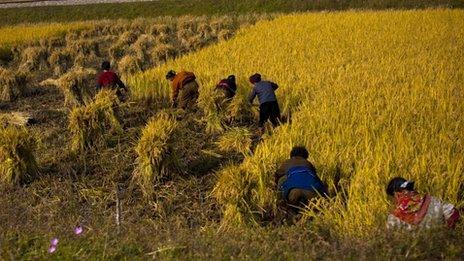Exploring North Korea's contradictions
- Published
- comments
The BBC's Damian Grammaticas inside North Korea
North Korea says it is ready to put a satellite into space this week in a move that has been condemned by America as a clear violation of UN resolutions. The launch is part of celebrations for the 100th birthday of the country's founding President Kim Il Sung, now dead, and is meant to showcase North Korea's achievements. Our correspondent Damian Grammaticas is the only British broadcaster in the usually closed country, invited by the North Korean authorities.
Today we sped, down long, half-empty avenues. Our North Korean minders were taking us out of the capital Pyongyang to the countryside.
Being here, in the world's last Stalinist state, feels like being transported back in time.
North Korea often looks like a place marooned, a survivor from an age when Soviet republics, with their strongmen rulers, were common.
The streets of the capital are lined with rows of towering concrete blocks. But there's not a shop with a window display or advertising hoarding to be seen.
From inside the goldfish bowl of our tour bus we catch glimpses as we are whisked to destinations not of our choosing.
All across Pyongyang, final preparations are being made for the huge celebrations planned for the coming days.
Groups of soldiers work to fix broken pavements, women wash the walls of buildings by the roadside, displays of flowers are being readied.
Huge paintings of North Korea's founding and eternal President Kim Il Sung, head of the dynasty that has ruled the country ever since, dot the streets.
Grim villages
The party is to celebrate his 100th birthday, though he died nearly two decades ago. Like much about North Korea, it seems contradictory.
We were soon out of the city, being whisked past grim-looking villages, and people toiling by hand in bare fields. Lines of tents were pitched on the hillsides where squads of soldiers were camping out.
Our destination, though, was a model project, the Daedonggang Fruit Farm, a thousand hectares of apple trees, all in perfect rows.

The North Korean government is keen to show off large fruit farms as a symbol of its success
It's the way North Korea wants to be seen - ordered, efficient, a modern socialist miracle. The farm, we were told, was made under the instructions of Kim Il Sung's son, the Dear Leader, Kim Jong Il, and is now being guided by his son, Kim Jong Un, the third of the Kims to rule over North Korea.
Kim Dal Hua, one of the workers tending to the apple trees, told us: "I'm very happy working here, it's thanks to Kim Jong Il and Kim Jong Un who ensure we have everything we need."
Everyone here keeps telling us how wise and benevolent the ruling Kim dynasty is.
But somehow there's often a feeling things may not be quite what they seem. When we entered the giant and ultra-modern fruit-processing factory at the farm, gleaming machines were producing cartons of apple juice.
But many of the workers didn't actually look to be doing much, and at one machine the women were picking up the boxes full of juice as soon as they reached the end of the production line and putting them back on the start, juice going round and round in circles.
Turtles for all
Doubts linger too over the centrepiece of the planned celebrations this week, the rocket launch to put a satellite in space. North Korea says the rocket is ready to go. But America insists it will actually be a test of missile technology, and the rockets might, one day, be used to carry nuclear warheads and threaten US cities.

The giant murals of Kim Il Sung and Kim Jong-il are designed to cement the dynasty
But North Korea insists it is misunderstood. That's why it invited our group of journalists in to witness the launch and the celebrations, so it can trumpet its achievement and say it has nothing to hide.
We were shown another brand new farm. This one was also, we were told, built very recently on the instructions of Kim Jong Il. Huge sheds held lines of water tanks to breed turtles, an expensive delicacy when eaten, and an ingredient in traditional medicine too.
The manager Bang Dok Son said the farm had cost "millions" to build, so I asked when it would start to make a profit.
"It is hard to explain if you have a capitalist mindset," said Mr Bang.
"Our leaders built this, instructing us to provide turtles for the people - to us profit doesn't matter."
But as we headed back to the city, we passed stretches of bare fields, then a theme park under construction, and more lines of shabby huts, the contradictions of a country that struggles to feed its people, yet whose leaders dream grandiose dreams.
- Published9 April 2012
- Published11 April 2012

- Published28 March 2012

 Tour of mission control HQ
Tour of mission control HQ
 'Nothing quite as it seems' in N Korea
'Nothing quite as it seems' in N Korea
 Inside the rocket launch site
Inside the rocket launch site
 Rally for founding father Kim Il Sung
Rally for founding father Kim Il Sung